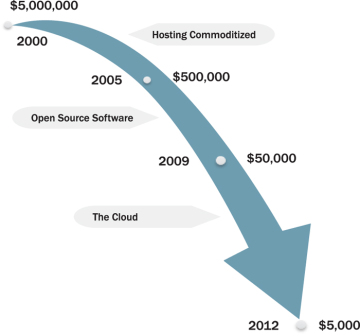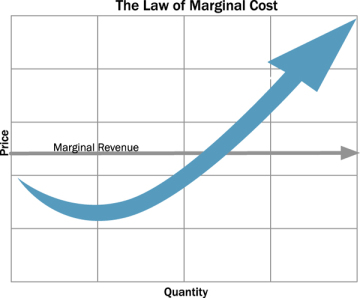- Innovation adoption curve
- Commoditization of technology
- The value of network effects
Commoditization of technology
- “As information technology’s power and ubiquity have grown, its strategic importance has diminished. The way you approach IT investment and management will need to change dramatically ... It is difficult to imagine a more perfect commodity than a byte of data—endlessly and perfectly reproducible at virtually no cost ... IT management should, frankly, become boring.”
- —Nicholas Carr
In an infamous article published in 2003 by the Harvard Business Review, Nicholas Carr asserted that information technology serves a similar purpose in industry as any other major technology has, such as railroads, the assembly line, or combustible engines. At first these innovations are proprietary and offer a substantial advantage in the market for those who possess this technology. But over time the technology becomes more common and standardized, providers more plentiful, competition rises, and consequently, the value of that technology becomes insignificant from a competitive perspective.
Commoditization of technology is all around us. For example, bandwidth and hosting costs are trivial now, compared to 10 years ago. So is the cost of a new laptop, unless you buy a Mac (an excellent example of positioning strategy at work). Apple has managed to escape the commodity vacuum arguably by making their products not about the technology. When you look at the now famous marketing of the iPod for example, it wasn’t about gigabytes or megahertz. It was simply about “a thousand songs in your pocket.” In this case, technology is the means, not the end goal.
If we look at Internet consulting firms today, it’s not really about building a website any more. Outsourcing has certainly commoditized those skills, and open source software like WordPress and its free design themes have eased the design concerns for most low-budget websites. Even writing better code is less important now with cheap RAM, CPUs, and mature concepts of server clustering. Consulting firms that are still going strong in 2012 are those focusing on the application of technology for the purposes of marketing, not the production of it. SEO and social marketing firms are red hot in 2012. Even at the higher end of the market, IBM has shifted away from technology and toward strategy consulting. As IBM’s strategic executive Irving Wladawsky-Berger noted in 2003, “We’ve entered the post-technology era.”
An article written by Timothy M. Chester in the Educause Quarterly went as far as saying that educators need to be mindful of training “future technology advocates and CIO leaders, not the leaders of technology mechanics,” 3 further recognition that the tide has shifted toward strategic use, not implementation. Chester suggests that projects and budgeting should no longer be considered IT projects, but rather as human resource projects, marketing projects, training products, and so forth, all of which utilize IT (a commodity resource) for their implementation, similar to how a house or office building project would implement electricity and plumbing.
In another interesting data point, Mark Suster of GRP Partners spoke about the explosion of technology entrepreneurship in the past 10 years.4 He illustrates with a slideshow how substantially the cost of technology decreased for starting a business by 2011.5 The proliferation of cloud computing, APIs (Application Programming Interfaces) for mashups, open source frameworks, and low-cost SaaS applications have dramatically reduced operating costs and increased opportunity to create compelling products by way of combining these technologies (Figure 4.3).

Figure 4.3. The cost of technology.
Though the process of commoditization may have accelerated in recent years, the phenomenon is nothing new. As far back as 1823, others such as David Ricardo and Karl Marx pontificated the Law of Diminishing Returns, asserting that the profits for a given unit will eventually be reduced to the incremental cost of production for an additional unit. So if it costs $1 to produce an additional cup of coffee once the original template is perfected, then that is the eventual price target for that cup of coffee. Likewise, if the cost of reproduction for a unit of software is $0 (it costs nothing to digitally duplicate software), the eventual price target should be close or equal to $0 (Figure 4.4).

Figure 4.4. Marginal cost.
Your products and even your business are inevitably headed toward commoditization unless you reinvest in them so that users get additional value when they buy from you. If you haven’t reinvested by the time your products are commoditized, then you yourself have become a commodity. The only way to overcome this is to focus on the value you provide around that commodity. And yes, it is possible to do after the fact.
If you’re a technologist or a technical entrepreneur, what do you do with this information? The lesson is not to avoid technology, but rather to build value around it, either with auxiliary services or by focusing your technology development efforts on how to augment existing commoditized technology, always innovating and staying a couple steps ahead of commoditization.